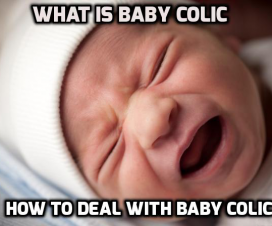Fact: Baby colic will affect about 20% of all babies. Imagine this situation: you bring your newborn baby home; you are overjoyed and amazed by them, you marvel at their every move. Then suddenly when your child is about 2 weeks old your perfect little bundle of joy somehow becomes your worst nightmare. They cry and they cry and they cry.
Wishing your baby could tell you exactly what they are feeling you do everything that you were taught to do; check to make sure that they are not hungry, soiled or tired. You even grab every single baby book that you bought desperately hoping to find the answer. You come here only to realize that there is a chance that your baby is suffering from baby colic.

What is Colic?
In order to explain what baby colic is I like to use what I call the three, three, three formula. To elaborate, colic is defined as:
Excessive crying for 3 hours or more for
At least 3 times a week for
More than 3 consecutive days
Even though these are great signs of identifying baby colic in infants; it doesn’t mean that your baby has colic if they show these signs. So before you go tearing your hair out because of all the frustration that you feel (and understandably so), take comfort in the fact that doctors have stated that babies suffering from colic will eventually grow out of it. But of course until then you will feel like you are living in hell as you are told you are generally unable to comfort a colicky baby.
More about Baby Colic
The good thing to note is that baby colic is not related to any serious medical conditions. However, one should not be too quick to dismiss a baby’s constant crying as baby colic as the crying could be indicating something more serious.
Before you self diagnose your child be sure to consult a pediatrician. Additionally you may need to examine your diet as your child’s colic could be as a result of you consuming cow’s milk (to which your child might be allergic).
Dealing with Baby Colic
Parents of children suffering from baby colic need to understand that:
They cannot blame themselves for not being able to stop the constant crying of their child
Baby colic is temporary – they will eventually grow out of it and
You will feel extra stress during this period
Traditional Methods of Dealing with Baby Colic
There are some traditional ways of dealing with baby colic. Tummy massage, changing your diet, changing formulas, homeopathic drops, and of course the default….wait until they grow out of it.
What if you don’t want to wait for the baby colic to stop at 5 months of age? There are some new recommendations out there for dealing with baby colic. I encourage you to check them out and find what works best for you and your baby in dealing with baby colic.
